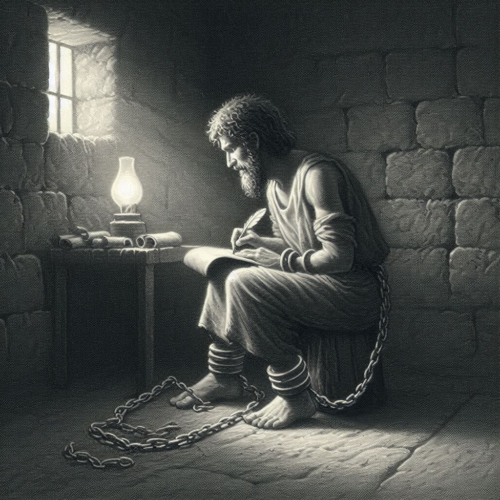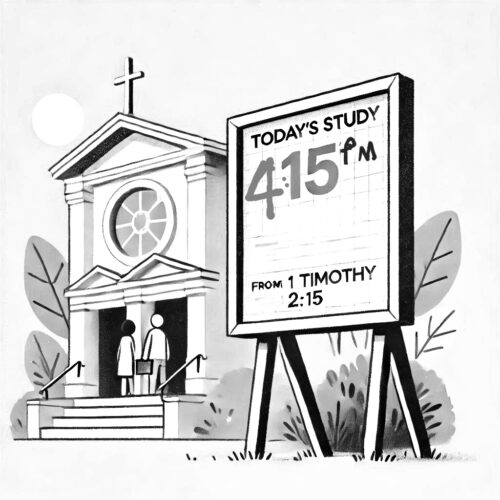Five Eyewitnesses of the Resurrection: Their Compelling Testimony
The greatest evidence for the truth of Jesus’ resurrection lies not just in historical accounts, but in the transformed lives of these five men: eyewitnesses of the Resurrection. These ordinary men, once cowards who deserted Jesus during His crucifixion, became emboldened evangelists, willing to suffer excruciating persecution, even martyrdom to proclaim the Gospel. The transformation in the lives of these eyewitnesses of the resurrection has no adequate explanation—other than a personal encounter with the risen Christ Himself, and of course, the presence in them, since Pentecost, of the abiding Holy Spirit…
John: From Power Seeker to Apostle of Love
John, once a man who sought positions of power and authority (Mark 10:35-37), experienced a dramatic transformation having met the risen Lord. It turned this ambitious disciple into the apostle of love, a title earned through his deep devotion and the themes of love that permeate his writings. His Gospel and Epistles emphasise love, truth, and eternal life, showcasing the radical change in his heart and mission (1 John 4:7-8, John 13:34-35).
The personal encounters with the resurrected Christ (John 20:19-29) instilled in John a new, unshakeable purpose. He became a fervent proclaimer of Jesus as the Son of God and the source of eternal life (John 20:31). His conviction about the divinity of Jesus, particularly evident in the unique “I am” statements he quotes in his Gospel and in Revelation (John 8:58, Revelation 1:17-18), undoubtedly stemmed from witnessing the resurrection. John’s transformed life and unwavering faith ultimately led to his exile on the island of Patmos, where he wrote the book of Revelation (Revelation 1:9). The change from a man seeking power to one who embodied and preached love highlights the profound and unparalleled impact of the resurrection.
Peter: From Denial to Devotion, even Painful Death
Peter, who vehemently denied Jesus on three occasions on the night of the crucifixion (Luke 22:61-62), was later engulfed in deep remorse and contrition over it. The weight of his denial crushed him, leaving him broken and ashamed. However, his encounter with the risen Lord transformed him in ways nothing else could. When Jesus appeared to Peter after the resurrection, He lovingly reinstated him. In a poignant conversation, Jesus asked Peter three times if he loved Him, each time commissioning him to “feed my lambs” and “tend my sheep” (John 21:15-17). This powerful reinstatement reaffirmed Peter’s role as a shepherd of Jesus’ followers and rekindled his purpose.
This transformation was evident in Peter’s subsequent actions and writings. No longer the fearful man who denied Jesus, Peter became a bold and unwavering proclaimer of the Gospel. His epistles convey profound lessons on suffering, humility, and the hope found in Christ (1 Peter 5:6-10). Peter’s journey from denial to devoted discipleship culminated in his martyrdom: tradition tells us he asked to be crucified upside down, saying he unworthy to die in the same manner as his Lord. From Peter’s life, we learn about the boundless grace of Jesus and the immense power of the resurrection to transformed the most broken and contrite heart into a pillar of faith and leadership.
Thomas: From Doubt to Devotion, the Apostle Who Brought the Gospel to South India
Thomas, often remembered as “Doubting Thomas,” was a relatively quiet figure in the Gospels, mentioned infrequently and without significant prominence. However, his moment of doubt following the resurrection marked a pivotal change in his life. Declaring that he would not believe unless he saw and touched Jesus’ wounds (John 20:25), Thomas expressed a scepticism that was transformed by a personal encounter with the risen Lord. When Jesus appeared to him and invited him to touch His wounds (John 20:27), Thomas’ doubt turned to profound faith, leading him to exclaim, “My Lord and my God!” (John 20:28). This encounter eradicated his uncertainty and ignited a passionate commitment to the Gospel.
Empowered by his newfound conviction, Thomas took the Gospel far and wide, becoming the first to bring the message of Jesus to South India. His missionary journey established a vibrant believing community that persists to this day, a testament to his unwavering faith and dedication. The courage to undertake such a sacrificial lifestyle, ultimately leading to his martyrdom in South India, underscores the transformative power of his encounter with the risen Christ. Thomas’ story is yet another compelling evidence for the truth of the resurrection: it is difficult to believe Thomas would choose such a lifestyle, even martyrdom, unless he had indeed witnessed the risen Lord.
Stephen: The First Martyr, Transformed by the Power of the Resurrection
Stephen, though not among the original twelve apostles, was profoundly transformed by the resurrection of Jesus and became the first Christian martyr. Selected as one of the seven deacons to help serve the early church (Acts 6:5), Stephen quickly distinguished himself through his wisdom and the power of his preaching. In his bold and uncompromising final speech (Acts 7), Stephen recounted the history of Israel, emphasizing their continuous resistance to God’s messengers and culminating in the ultimate rejection and crucifixion of Jesus, the Righteous One. His fearless proclamation of the truth incited the fury of his audience, leading to his brutal execution by stoning.
Even in the face of such a horrific death, Stephen’s transformation through the resurrection was evident. As the stones rained down on him, and with no place to hide, Stephen saw a vision of Christ standing at the right hand of God (Acts 7:55-56), affirming his faith and strengthening his resolve. In his final moments, echoing the forgiveness of Jesus on the cross, Stephen prayed for his executioners, saying, “Lord, do not hold this sin against them” (Acts 7:60). His willingness to forgive even while enduring a painful and violent death underscores the profound impact of the resurrection on his life, transforming him into a powerful witness of Christ’s love and grace.
Paul: From Persecutor to Proclaimer, Transformed by the Risen Lord
Paul, originally known as Saul, was a fierce persecutor of Christians, zealously hunting down followers of Jesus to imprison and execute them (Acts 8:3). However, his life was radically transformed when he encountered the risen Lord on the road to Damascus (Acts 9:3-6). The dramatic conversion, which Paul himself recounts multiple times (Acts 22:6-16, Acts 26:12-18), marked the turning point from being a Christ-hater to becoming one of His most devoted apostles. The vision of Christ and the overwhelming experience of His love transformed Paul, leading him to toil more, undergo greater persecutions, floggings, and imprisonments than any other apostle (2 Corinthians 11:23-27). Despite these hardships, Paul continued to support his ministry through tentmaking during the day, allowing him to preach the gospel freely without being a financial burden to the churches (Acts 18:3).
Even in chains, Paul’s dedication to spreading the gospel never wavered. He shared the message of Christ with fellow prisoners and jailers (Acts 16:25-34), and continued to write letters that would become a significant portion of the New Testament. Driven by the love of the Saviour, Paul’s epistles address theology, church practices, and personal encouragement, forming two-thirds of the New Testament. His writings have profoundly shaped Christian doctrine and continue to influence believers worldwide. According to tradition, Paul was martyred in Rome under Emperor Nero, beheaded for his unwavering faith. His legacy, embodied in his epistles and the churches he established, endures as a testament to the transformative power of the resurrection and the unrelenting love of Christ.
The Five Eyewitnesses of the Resurrection: Their Compelling Testimony
Then and now, the changed lives of Jesus’ disciples serve as compelling evidence of the resurrection’s reality and Jesus’ continuing presence. These once ordinary men were empowered by the Holy Spirit to reach the world with the message of hope and salvation. From Peter’s bold proclamations to Paul’s tireless missionary journeys, the legacy of these transformed lives endures through the scriptures and the ongoing growth of the Christian faith. Their willingness to face martyrdom for their beliefs speaks volumes about the truth of the resurrection, encouraging even us today to live out our faith with the same courage and conviction.
Related Reads
Editor's Pick
The Cornerstone Metaphor and Jesus: What’s the Crucial Connection?
VITAL SALVATION LESSONS FROM THE PARABLE OF THE TENANTS (MATTHEW 21) The Cornerstone Metaphor and Jesus: Imagine a single stone [...]
Are Angels Real? Reformed Views on the Spirit Messengers
Angels exist in our collective imagination as ethereal, winged creatures floating on clouds, strumming harps, or dramatically intervening in human [...]
Feminism’s Impact on Biblical Womanhood: Blessing, Curse, or Both?
Feminism’s Impact on Biblical Womanhood: The feminist movement emerged from legitimate pain—of women silenced, overlooked, and systematically marginalised in both [...]
Life After Death: Can Our Deceased Loved Ones See Us Now?
Grief creates a profound ache—a longing to reconnect with those we've lost. Many Christians wonder: Can our deceased loved ones [...]
Conspiracy Theory: Were Early Christian Writers Seeking Power?
*Editor’s Note: This post is part of our series, 'Satan’s Lies: Common Deceptions in the Church Today’… Were early Christian [...]
Did Jesus Really Die On the Cross? Medical Proof Vs the Swoon Theory
*Editor’s Note: This post is part of our series, 'Satan’s Lies: Common Deceptions in the Church Today’… DID JESUS REALLY [...]
‘Saved Through Childbearing’: What Does 1 Timothy 2:15 Mean?
Ancient Ephesus, with its temple to Artemis and its deeply entrenched pagan beliefs about childbearing and feminine power, provides the [...]
Why Can’t There Be Forgiveness Without the “Shedding of Blood”?
Hebrews 9:22 Explained The question haunts the modern mind: why would a loving God require blood for forgiveness? In ancient [...]
Praying in the Spirit: How the Holy Ghost Empowers Our Prayer Life
Ever sat down to pray and felt like you're just talking to the ceiling? If you're not a believer in [...]

Which Saves the Believer: Christ’s Life, Death, or Both?
Which Saves: Christ’s Life, Death or Both? Throughout church history, Christians have pondered the relationship between Christ's perfect life and [...]
SUPPORT US:
Feel the Holy Spirit's gentle nudge to partner with us?
Donate Online:
Account Name: TRUTHS TO DIE FOR FOUNDATION
Account Number: 10243565459
Bank IFSC: IDFB0043391
Bank Name: IDFC FIRST BANK















